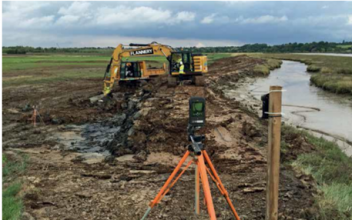Case study:Fingringhoe Managed Realignment: Difference between revisions
No edit summary |
No edit summary |
||
| (One intermediate revision by the same user not shown) | |||
| Line 1: | Line 1: | ||
{{Case study status | {{Case study status | ||
|Approval status= | |Approval status=Approved | ||
}} | }} | ||
{{Location | {{Location | ||
| Line 39: | Line 39: | ||
|Specific mitigation=Flood and coastal erosion protection, | |Specific mitigation=Flood and coastal erosion protection, | ||
}} | }} | ||
{{Measures}} | {{Measures | ||
|Other technical measure=Salt marsh and mudflat restoration, | |||
}} | |||
{{Hydromorphological quality elements header}} | {{Hydromorphological quality elements header}} | ||
{{End table}} | {{End table}} | ||
Latest revision as of 15:01, 8 November 2018
Project overview
| Status | Complete |
|---|---|
| Project web site | http://www.therrc.co.uk/sites/default/files/projects/52_fingringhoe.pdf |
| Themes | Flood risk management, Habitat and biodiversity, Land use management - agriculture, Social benefits, Water quality |
| Country | England |
| Main contact forename | Merle |
| Main contact surname | Leeds |
| Main contact user ID | |
| Contact organisation | Environment Agency |
| Contact organisation web site | http://www.gov.uk/government/organisations/environment-agency |
| Partner organisations | Essex Wildlife Trust, Natural England, Place Services, private landowners, local volunteers |
| Parent multi-site project | |
| This is a parent project encompassing the following projects |
No |
Project summary
The Fingringhoe Intertidal Habitat Creation Project has created 22ha of new, internationally important intertidal habitat on the Colne estuary in Essex (Map 1). The project was managed through a central partnership between the Environment Agency and Essex Wildlife Trust, with additional partners coming on board at different times. These included Natural England, neighbouring landowners and around a hundred volunteers. This project was conceived in 2011 and implemented in 2015 when a 300m breach in the seawall was constructed at Fingringhoe. This landscape-scale conservation project not only enhances biodiversity improvements onsite, but also supports internationally and nationally designated sites. Working in partnership has meant it was possible to create some of the most cost-effective intertidal habitat in the country.
Monitoring surveys and results
Lessons learnt
Image gallery
|
Catchment and subcatchment
Site
Project background
Cost for project phases
Reasons for river restoration
Measures
MonitoringHydromorphological quality elements
Biological quality elements
Physico-chemical quality elements
Any other monitoring, e.g. social, economic
Monitoring documents
Additional documents and videos
Additional links and references
Supplementary InformationEdit Supplementary Information
| ||||||||||||||||||||||||||||||||||||||||||||||||||||||||||||||||||||||||||||||||||||||||||||||||||||||||||||||||||||||||||||||||||||||||||||||||||||||||||||||||||||||||||||||||||

